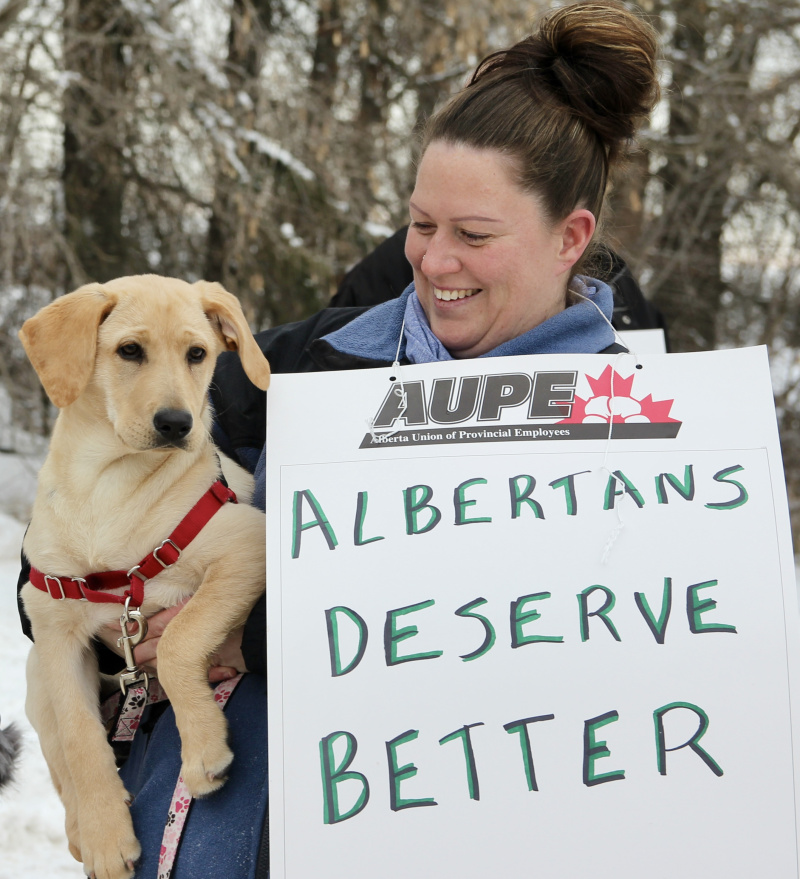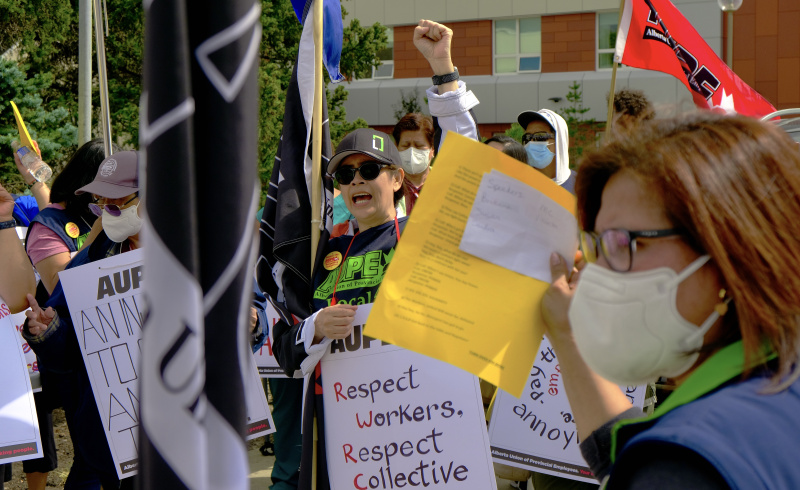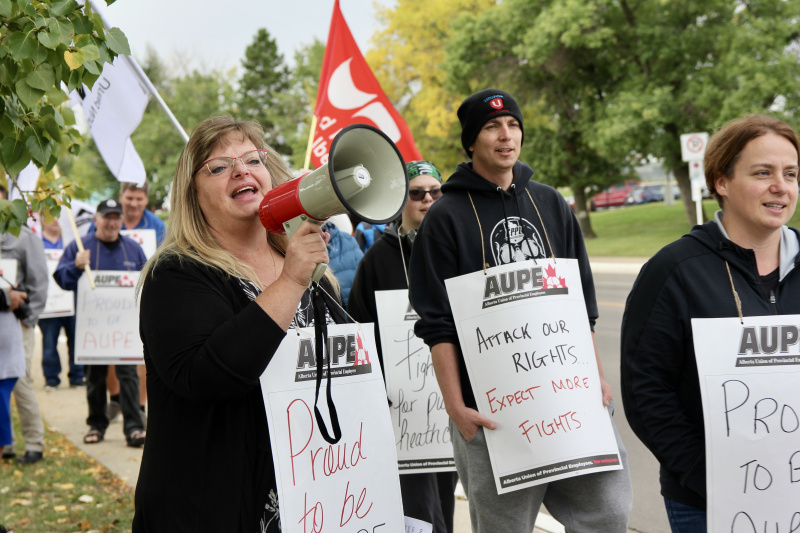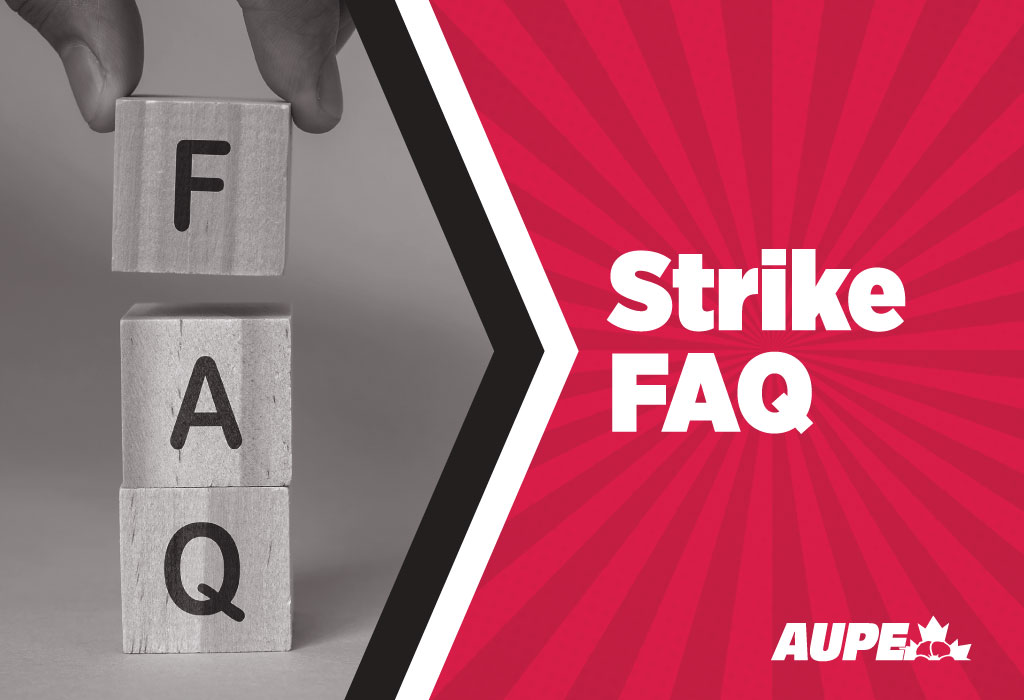Intro to Strikes

Strikes are a powerful tool when negotiations break down. Once we get to that point, a strong strike mandate is the best way force our employers to give us higher wages and better working conditions
Before 2015, thousands of AUPE members did not have the legal right to strike. For many, 2025 is the first time they have faced a potential work stoppage. Understandably, AUPE members have questions about what to expect if they go on strike.
AUPE members must prepare for a strike, whether or not we actually get to that point. If in doubt, contact AUPE’s Member Resource Centre to ask questions about going on strike. You can call the Resource Centre at 1-800-232-7284, Monday to Friday, 8:30 am to 4:30 pm.
Before you do, here are some ways you can prepare for a strike.
Strike votes

Before going on strike, AUPE members must decide if that is what they want to do. Going on strike is not a decision made lightly. However, taking action is often the only way to force our employers to give us the raises, improved benefits, and working conditions we deserve.
Members must create a MyAUPE account on AUPE.org to participate in a strike vote.
You may hear talk of “a strong strike mandate.” But what is that? Simply put, a strong strike mandate is when the overwhelming majority of members vote in favour of a strike. A ‘weak’ strike mandate might be if only half of all members want to go on strike.
A strike vote is union democracy in action. No one is just going to order you to go on strike – it’s a decision that you and your coworkers make with a strike vote.
A strong strike mandate can scare your employer. They will often give us a better offer because they want to avoid a strike. Regardless, members who vote to strike should prepare to walk the strike line.
Joining a strike line
All members, including those who work remotely, are expected to join their assigned strike line.
Members with certain accommodation requirements (medical, distance, etc.) may not be expected to join the strike line.
Mentally preparing for a strike

Going on strike can be difficult, especially if it lasts a long time. Solidarity and support from your family, friends, and coworkers goes a long way to help with that.
If you feel a lot of stress or pressure about going on strike, talk about it. Find those people in your life who will give you confidence and cheer you on.
Talk about what going on strike could mean for your household budget in the short-term. Don’t be afraid to ask for help if you need it.
But you should also talk about the long-term benefits of going on strike and winning a higher wage and better benefits.
Strikes are challenging, but they are a challenge that workers and union members have overcome time and again. We can overcome any hardship if we stick together.
If you or your loved ones are in need of support, please contact the AUPE Crisis Support line (1-844-744-7026).
Strike Pay

You will not receive a regular paycheck from your employer when you are on strike.
Instead, AUPE provides members with strike pay.
- To collect strike, pay, you MUST have a MyAUPE account.
- In most cases, members must attend the strike line for a minimum of 30 hours to collect strike pay of $700 per seven days.
- If the length of your strikes is less than one week, please refer to the strike manual for how the strike pay may be prorated.
- Strike pay may be withheld for non-performance of strike duties.
All strikers must sign-in when joining a strike line, and sign-out when the strike line shift is completed. If you do not sign-in and sign-out, you will not receive credit for your hours on the strike line and will not be paid. To sign-in and sign-out, find the Strike Captain on duty.
Strike pay is not subject to income taxes.
AUPE also does its best to ensure your health benefits will be maintained during a strike.
Employees who are designated and authorized to work as Designated Essential Service Workers (DESWs) under the Essential Services Agreement may receive strike pay for performing strike line duty if the pay from their employer is less than strike pay.
Vacation and Leave Entitlements During Strike or Lockout
The Government of Alberta has refused to tell us how they will handle vacations, sick days, and other types of leaves during a strike or lockout.
AUPE assumes your employer will stop payment for most types of leaves.
However, members may file grievances if the employer tries to claw back what has already been approved and paid.
If your leave is during a strike or lockout, you are more likely to receive compensation if your new Collective Agreement is fully retroactive to a date before the strike or lockout began.
Note: The Collective Agreement may be enforced differently depending on whether you are a Designated Essential Services Worker (DESW).
Click for a full and in-depth breakdown of leave entitlements, such as Vacation, Sick Leave, Medical Appointments, Long-Term Disability and WCB in the event of a strike or lockout
Financial Preparation
It is important to financially prepare for a strike. Review your family budget – or create one – and put money aside for basics like food, rent, and other important bills and payments.
Your Bank
Talk to banks and creditors ahead of time to get a sense of possible arrangements. Almost all banks have policies to support customers going through a strike or lockout.
Consider paying off some of your credit card debt or taking out a line of credit to help prepare for an emergency.
Your pension is tied to your normal wage, not strike pay. Going on strike and receiving strike pay instead of your normal wage will not affect your pension.
Housing
For renters: Landlords hold a lot of power and privilege in society. Talk to your landlord ahead of time to discuss late or reduced payment arrangements. Some landlords will agree, some will not. Try to get what they say in writing.
For homeowners: A mortgage lender has more power than all other creditors. Make arrangements with your bank or credit union according to your ability to pay. They are often open to a temporary payment plan, which keeps your mortgage debt at the same level for the duration of the strike.
Utilities
It is impossible to make payment arrangements with utility companies, and they may cut off services if your payments are late. They will also charge you extra money to reconnect your services, even after you have paid all you owe.
Paying utilities one month late probably won’t get your services cut off. But it is best to pay utilities as on-time as possible.
Pension Information & FAQ
You’re still a pension plan member even if there is a work stoppage.
Your membership in the plan continues despite a work stoppage and you don’t lose any pension entitlement earned up to the date the strike or lockout began.
Your qualifying service continues to increase during the work stoppage.
Qualifying service starts when your employment begins and continues until your employment ends unless there is a break of more than 52 consecutive weeks. Qualifying service determines things like retirement eligibility (e.g., rule of 85). During a strike or lockout, your qualifying service continues to increase.
Your pensionable service does not increase during the work stoppage.
If you go on strike or your employer locks you out, neither you nor your employer will make pension contributions for the hours you aren’t working. This means your pensionable service does not increase.
Strike pay received through the union is not pensionable.Since the pension formula uses your pensionable service in calculating your pension benefit, your pension benefit does not grow during the work stoppage.
FAQ:
Q. Can I buy the pensionable service for the period I didn’t work because of the work stoppage?
A. Members who have participated in a legal strike, resulting in a break in pensionable service, are eligible to purchase the pensionable service corresponding to the strike period upon their return to work.
Q. How much does it cost to purchase the service?
A. Employees opting to buy back pensionable service for the strike period must contribute both the employee and employer portions of the pension contributions for the duration of the strike.
The contribution amount will be calculated based on the employee's salary immediately preceding the strike period.
What to expect on the strike line

A strike line is where strikers put pressure on their employer.
We walk the strike line to flex our power and show the public that they should avoid our employer while we’re on strike, if they can.
Strike lines are usually set up at the worksite. This helps us interrupt our employer’s routines, shut down their operations, and share information.
Media and reporters will often come to our strike lines. Direct all media requests to the Strike Captain and the AUPE Communications Team.
Stay connected to AUPE.org to get the latest bargaining updates and union news.
The strike line belongs to the Union. Follow these guidelines to maintain a safe and positive strike line.
How long will the strike last?

Strikes can last hours; they can also last months.
Strikes end when the employer and our negotiating team reach a tentative agreement. Sometimes, they end when the government defies our charter rights and uses the law to force us back to work.
Lately, the Alberta government has tried to stop other workers from striking. If the government legislates restrictions or eliminates your right to strike, AUPE will assess the situation and provide you with clear directions.
We have the power to keep strikes short. The longer the strike line, the shorter the strike.
Solidarity is the most important tool we have to prevent long strikes, and that means getting everyone we can to join the strike line and show our employers that we are serious.
Strong strike mandates, strong turnout on the lines, and no workers crossing the line (ie. scabbing) lead to quick, decisive wins.
Nevertheless, it is difficult to predict the length of any strike.
What else can I do to support the strike?
Here's how you can help during a strike.
- Contact your Strike Captain on your strike shifts and offer your help.
- Volunteer to bring supplies, food or water.
- Spread awareness about the strike goals on social media and in your community.
- Create or update your MyAUPE account today.
